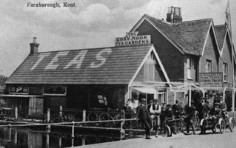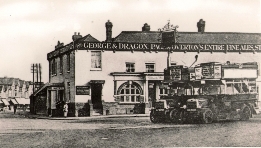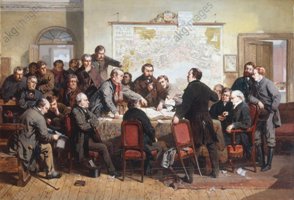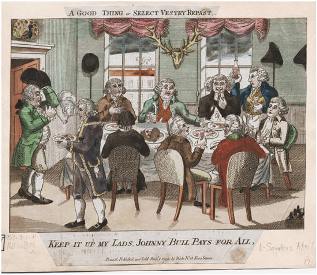


VESTRY MEETINGS
In April every year, St. Giles Farnborough, along with other Church of England parishes, holds its Annual Parochial Church Meeting. In the published agenda, the first item is referred to as the ‘Vestry Meeting’, and has the sole purpose of electing officials and deputies to serve on the Parochial Church Council for the following year. In a parish like St. Giles, competition for such offices is customarily not that intense, so the vestry meeting is usually all over in a minute or so, and discussion then moves on to other no doubt more weighty topics.
A Vestry Meeting – Something Wrong with the Accounts by John Ritchie, 1867
Today’s vestry meeting is but a tiny remnant of something that was once very important indeed, so much so that at the high point of their powers, just prior to removal of Poor Law responsibilities in 1834, the collective vestries spent not far short of one-fifth of the budget of the entire national government.
The term is seldom used today, except in its limited ecclesiastical context, but ironically has been adopted for many other purposes which have a tenuous historical worth. A Google search brings up in its top pages many hotels and restaurants called ‘The Vestry’, along with a source of dresses and costumes for hire, apartments, a school of dance, a museum, and even a nightclub.
The Vestry in Farnborough
The following examples, taken from 18th Century accounts, give a flavour of some of the responsibilities borne by the Farnborough Vestry. Contributions for food, clothing, and means of heating for the poor of the Parish, together with payments to midwives, and in times of sickness, feature prominently, as do burial costs. As well as payments for Church maintenance, (which may chime with our contemporary obligations!) there are also costs associated with keeping the peace, and the enforcement of religious and moral discipline.| £ | shillings | pence | ||
| 1717 | Given ye disbanded soldiers | 0 | 1 | 0 |
| Pd Edward Dalton for mending ye Stocks | 0 | 0 | 9 | |
| 1718 | Pd for mend ye Church winoos | 0 | 4 | 0 |
| Pd for bread & wine at Xmas | 0 | 2 | 1 | |
| Pd ye Glassier for mending of ye Church windows | 0 | 2 | 7 | |
| 1724 | Pd William Allen for repairing the Steeples for one year | 0 | 5 | 0 |
| Pd for gathering up the Timber & Shingles when the Spire of the Chh was blown down | 0 | 2 | 6 | |
| 1725 | Recd. 20s Levied up on Thomas Brook for selling strong Waten & suffering Tipling in his House not being Licensd | 1 | 0 | 0 |
| To the Widow Cole lately sick of the Small Pox | 0 | 10 | ||
| 1742 | Paid for Wido ffrench's children shoes | 0 | 1 | 0 |
| Paid for frock for Wido ffrench's child | 0 | 3 | 6 | |
| Paid James Gregory towards burying his child | 0 | 1 | 0 | |
| Paid William Whiffin fetching the midwife | 0 | 0 | 6 | |
| Paid nursing Widow ffrenches children to Dame Wright 26 weeks at 3/6 | 4 | 11 | 0 | |
| Pd 2 pecks beans & 2 pounds pork for John Burr | 0 | 2 | 0 | |
| Paid for 1/4 hund of wood and 4 Bundles of Chips for Wido Cole | 0 | 3 | 6 | |
| 1745 | Paid Expenses going round the parish to warn the papists | 0 | 2 | 0 |
| 1750 | Paid Thos Winne for for 2lb of Mutton for a poor Woman at Chalk Barn | 0 | 0 | 7 |
| 1756 | Pd Mr Bennett Stewd of the Court for granting a Lease for 31 years from 1755 for the poor Houses | 1 | 1 | 0 |
| Pd for Straw for the poor House | 0 | 14 | 0 | |
| 1760 | Pd Thos Lee for Going to London with a poor Woman to the Osspitall | 0 | 10 | 0 |
| 1767 | Gave Jane Kebble in her illness | 0 | 10 | 6 |
| Charges in the Small Pox on Mr Gregory's family | 7 | 19 | 3 | |
| Paid Mr Edwd Wiffin who paid Mrs Pucknall for a man going there with the Small Pox | 5 | 5 | 0 | |
| Paid Herman for Coffin and Shroud for ye Above | 0 | 12 | 2 | |
| Paid for fetching the above to be buried | 3 | 0 | ||
| Pd Parson and Clerks ffees | 4 | 6 | ||
| Pd for Beer for the bearers | 2 | 4 | ||
| 1790 | Gave Jas Edwards for going to all the neighbouring parishes round to put Hand Bills for the Robbery of Farnborough Church the first inst.with two guineas reward for the Discovery | 0 | 2 | 6 |
| Paid for tacks for putting up the said Bills and writing them | 0 | 0 | 6 | |
| What was stolen was a large red Comminion Cloth and Surplice | ||||
| Pd Richardson for repairing the Locks of the Chh Chest when it was broke open by Thieves | 0 | 0 | 6 | |
(all spellings are reproduced from the original document) |
The Vestry System
The division of England into ancient parishes after Saxon times was linked to the manorial system, with parishes and manors often sharing the same boundaries. But as the manors declined the parishes became progressively more important. In the 16th century, the increasing power of the Church led to a new form of parish meeting, dealing with both civil and ecclesiastical affairs, which evolved to become the ‘Vestry Meeting’. This new meeting was supervised by the parish priest, customarily the best educated of the inhabitants.Although the vestry committees were not established by any law, and had come into being via an unregulated and ad-hoc process, it was nevertheless highly convenient for them to progressively perform more aspects of what we would today regard as ‘local government’. With this eventually came a number of legal obligations, notable among which was the task of administering the Edwardian and Elizabethan systems for support of the poor. This was their first, and for many centuries their principal statutory power.
The vestry was responsible for appointing parish officials, such as the parish clerk, sextons and scavengers, constables, night watchmenn and Overseers (see below).
The decisions and accounts of the vestry committee would be administered by the parish clerk, and records of parish business would be stored in a 'parish chest' kept in the church and provided for security with three different locks, the individual keys to which would be held by such as the parish priest and churchwardens.
Overseers
Overseers had an administrative role operating the poor relief system: distributing money, food and clothing. as part of the Poor Law system. The Overseer position was created by the Act for Relief of the Poor of 1597. They were unpaid, and therefore often reluctant appointees, working under the supervision of a Justice of the Peace. The system of poor relief reinforced a sense of social hierarchy and provided a way of controlling the 'lower orders'. Overseers of the poor were replaced in the Poor Law Amendment Act 1834, see 'Decline of the System' below.The Select Vestry
The vestry was a general meeting of all inhabitant rate-paying householders in a parish. However in the 17th Century the huge growth of population in some parishes, mostly urban, made it increasingly difficult to convene and conduct meetings. Consequently, in some of these a new body, the Select or Close Vestry, was created. This was an administrative committee of selected parishioners whose members generally had a property qualification and who were recruited largely by co-option.This took responsibility from the community at large. It did improve efficiency, but over time tended to lead to governance by a self-perpetuating elite. By the late 17th century, the existence of a number of autocratic and corrupt select vestries had become a national scandal. Several bills were introduced to parliament in the 1690s, but none became acts.
Decline of the System
By the 18th century, religious membership was becoming more fractured in some places, due for instance to the progress of Methodism. Nevertheless by 1834 more than 15,600 ecclesiastical parish vestries of the established church continued to exercise, by law, what we would today regard as diverse civil responsibilities.Pre-eminent among these continued to be the administration of the Poor Law, but the widespread unemployment following the Napoleonic Wars overwhelmed the vestries, and under the Poor Law Amendment Act 1834 this duty was transferred to elected boards of guardians for single parishes or to poor law unions for larger areas. As the century advanced the parish vestry progressively lost its secular duties to the increasing number of local boards which came into being for a specific purpose, and operated across areas greater than single parishes.
However, the proliferation of these statutory bodies led to a confusing fragmentation of local administration, and this became a driver for larger scale reform. This culminated in the Local Government Act 1894, which among a great number of other measures transferred all ‘civil’ responsibilities from the parochial vestries to new civil parish councils, leaving the vestries to be concerned with just wholly church matters.
Following the removal of their civil powers the vestry meetings continued, but there was a similar drive for reform, as described in a recent Lent Sermon at St. Giles by Archdeacon Paul Wright. This culminated in the Parochial Church Councils (Powers) Measure 1921 Act, which established parochial church councils as successors to the vestries on church matters. It is thus today that the PCC. rather than the vestry, is now legally responsible for the financial affairs of the church parish and the maintenance of its assets, such as churches and church halls, and promoting the mission of the church.
Nick Reynolds
Sources:
https://en.wikipedia.org/wiki/Vestry
www.londonlives.org
Farnborough and its Surroundings, by John Harland Blandford, 1913
St. Giles Church Archives
FARNBOROUGH VILLAGE
From Parish Archives:
The Vestry Meetings were well attended, and had frequently to be held at “The George Inn", the Vestry (in the church) being too small.
Very little was done in the old days without beer, even at Vestry meetings they had it up to October, 1717. One shilling was usually spent at Vestry meetings, but much more at Christmas and other times. At the October, 1717 Vestry meeting there be a charge—” Paid for two pots of porter, one shilling “—this is the last time any money was spent for beer and charged in the Churchwardens’ Accounts; but the Overseers at their Vestry meetings kept up the charge for many years, even after an order had been issued that beer at meetings must not be paid for out of the rates.
The order was only signed by one of the Justices of the Peace at Bromley, and was probably not legal, all other documents being signed by at least two Justices of the Peace; but in any case the order was not obeyed, and rather more was spent in beer.

